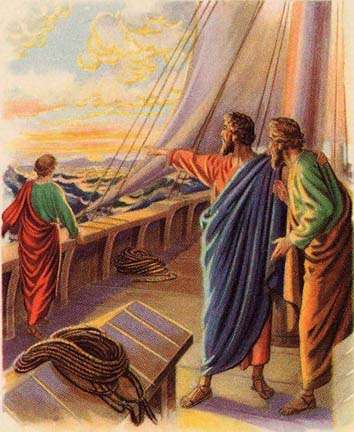There had been quite an ongoing debate as to which aspects of the Law of Moses would continue on in early Christian worship and gospel living. The apostles reconciled and decided that Gentile converts would not have to be circumcised and would only need to follow the Mosaic dietary laws insofar as they refused to eat animals sacrificed to idols and the blood of any animal.
The apostles and seventies traveled among the Gentiles in both Asia and Eastern Europe and established the Church among them. Everywhere they went, once the churches were established, they found seeds of apostasy and had to make corrections among the congregations. Some of this apostasy was purposely instigated by men who desired to win their own followings for gain to themselves. Other seeds of apostasy consisted of falling back on pagan traditions and cultural trappings. Festivals, for example, exert a powerful draw over the people who grow up with them. It is very difficult to abandon a traditional holiday and the foods and revelries that go with it. So we still see pagan influences in orthodox Christian practice.
Paul’s Second Missionary Journey
 The book of Acts was written by Luke. He apparently traveled with Paul on some of Paul’s missionary journeys, because he often uses the word ‘we’ when referring to the actions of Paul and his missionary companions (Acts 16:10).
The book of Acts was written by Luke. He apparently traveled with Paul on some of Paul’s missionary journeys, because he often uses the word ‘we’ when referring to the actions of Paul and his missionary companions (Acts 16:10).
During his second missionary journey, Paul preached in many Macedonian and Greek cities, including Philippi, Thessalonica, Berea, Corinth, and Athens. Paul was ever attentive to revelation through the Holy Ghost to guide him as he traveled and preached. However, he had a falling-out with Barnabas and Paul take Silas and Timothy as his companions.
The apostles of the Lord Jesus Christ were prophets. Those who say there have been no prophets since Christ deny the biblical account, which identifies Silas as a prophet, even though he was subordinate to Paul, an apostle.
In Acts 16:14–15 we read about Lydia, whose testimony of Christ developed because she “opened her heart.” True conversion requires that we lay aside our per-conceived notions so that God and Christ can teach us.
In Acts 16:16–24 we read about Paul and his companions’ imprisonment in Philippi. They were imprisoned for casting a devil out of a female who was a money-maker for her handlers. Paul’s deliverance from prison by a miracle hearkens back to Peter’s deliverance, and to several such incidents in the Book of Mormon.
At the beginning of Acts 17, we see Paul in Thessalonica, teaching in the synagogue for several Sabbaths, as he customarily did. Many were converted, but the Jews hired thugs and caused a riot. This scene was repeated often throughout Asia and Greece.
In Acts 17:16–34 we have the account of Paul’s visit to Athens. He finds the whole city taken in idolatry. He testifies to the Athenian philosophers and preaches on Mars’ Hill about the nature of God, the unity of people as offspring of God, and the Resurrection. The Athenians are really into “some new thing,” always seeking for the next wonder to impress them. They also sincerely worship their many gods, who are even less perfect than humans. They even have a way to worship “the unknown god.” Better to do that than to miss some deity that might need to be respected. Could it be that instinctively, because of the “light of Christ” we all are born with, they somehow knew they had an eternal creator somewhere, eternal Father to us all? Paul explained this One God, the only one they should be worshiping.
The philosophers in Athens “viewed God as an abstract being or power, rather than as the literal Father of our spirits. They worshiped God’s creations rather than God himself. They replaced revelation with reason and debate, valuing the wisdom of men more than the truths of God” (New Testament Gospel Doctrine Manual).
1 Thessalonians and 2 Thessalonians are letters from Paul to the Saints in Thessalonica. How few of these letters we have! How much more clear the gospel would be if we had more of what surely once existed.
The Thessalonians wanted to know how to prepare for the Second Coming of Christ. Paul counsels them to live lives of charity, peace, and righteousness. Thus, whenever Christ may return, they will be ready. Gratitude is an important part of the faithful, righteous life.
Additional Resource:
